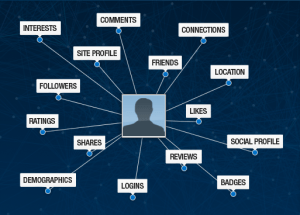Many companies have begun to realize that social is not just a new channel or a new fad, it’s a new way of doing business. But learning the ropes, how to use social networks and social channels, and optimize and tailor social features for one’s business is easier said than done. This is where Gigya enters the equation. The startup offers a SaaS technology (or a social CRM platform, if you will) to help businesses make their websites social, integrating their online appendages with Facebook, Twitter, LinkedIn, etc. and consolidating the best social features into one solution.
To date, the startup supports more than 280 million users each month across more than 500,000 sites, with customers that include names like CBS, Fox Sports, Intuit, The Coca-Cola Company, The Home Depot, and Turner Networks, to name a few.
Gigya is big on social widgets and plug-ins, offering businesses the best of both in an effort to increase social registrations to get that much-coveted social graph info on users and customers and make it easier for them to sign up from their favorite social platforms, word-of-mouth marketing, community interaction and engagement — all that good stuff. It may sound like industry jargon, but leveraging this kind of optimized social functionality can be a boon for businesses, increasing the sharing of a business’ content or brand reach on platforms where, let’s be honest, half of the world is now interacting.
While the startup has made a play into social commerce with widgets to integrate e-Commerce platforms with social networks, etc., Gigya is today announcing the launch of an important (and perhaps somewhat intimidating) new technology that has big data implications. Social data implications, of course. The tech has been dubbed the “Identity Management Platform”, and essentially, it enables businesses to better manage user data by providing them with complete, permission-based access to a user’s social, profile, and behavior data culled from activity on their websites.
What sets the Identity Management Platform apart from other user management systems is that it combines both social data and on-site activity data (like commenting and sharing). The point is to help businesses solve a big hangup inherent to data collection/management, being that many big businesses struggle to keep their customer registration up to date. Most often, they have to rely on the registration info provided by customers during their initial sign up, which tends to change with the tides.
Otherwise, businesses might be forced to go out and purchase customer data from third parties, which can be expensive, often lacks interest graph info, and just, well, puts a bad taste in your mouth. As a customer, you might be thankful that your interest graph info isn’t included in the third party-packaged identity info (that’s yours) being bought and sold, but for businesses this represents a customer targeting, retention, and service goldmine. And, let’s be honest, this is the norm.
By putting social and on-site activity data in the cloud, Gigya allows its clients to access their visitors’ up-to-date social data, leveraging it through email marketing campaigns, content recommendations, and even segmentation for hyper-relevant ad targeting.
 Importantly, users are authorizing sites to access their social/behavior graph data when they authenticate (with their social identities) when they register or login through Gigya’s social plugins that are integrated onto the business’ site. Again, potentially scary for users, but a huge time and money saver for big retailers, media companies, etc. The new platform also offers a cloud-based user registration system so that sites can maintain a unified user database across a network of sites by way of single sign-on for both social and traditional authentication.
Importantly, users are authorizing sites to access their social/behavior graph data when they authenticate (with their social identities) when they register or login through Gigya’s social plugins that are integrated onto the business’ site. Again, potentially scary for users, but a huge time and money saver for big retailers, media companies, etc. The new platform also offers a cloud-based user registration system so that sites can maintain a unified user database across a network of sites by way of single sign-on for both social and traditional authentication.
The Identity Management Platform is also integrated with Gigya’s suite of social plugins, including social login, ratings and reviews, comments, sharing, and game mechanics, so that clients can target their users all the more efficiently. For example, using the platform, marketers can easily create a list of all users who have a college degree, like travelling, and are socially influential.
Obviously, the social web provides businesses with the opportunity to understand their customers in more granular and focused ways, and by allowing these clients to access (and map) their users’ social data in the cloud, this has the potential to have a high value proposition for brands and their team of marketers. So look out, these teams are now becoming armed with realtime social data and tools that facilitate the personalization of ads and content, and soon they’ll know how to use it — and know who you are. Always?
